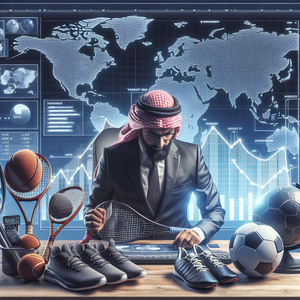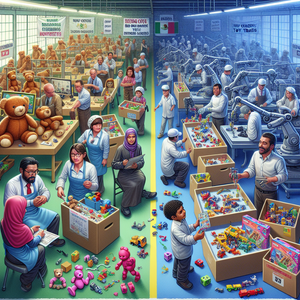
Sporting Goods Industry Careers: Navigating Tariffs and Emerging Market Trends in a Global Economy
The sporting goods industry is in the midst of a transformation, shaped by shifting market dynamics, fluctuating consumer preferences, and the lasting impact of tariff policies. U.S. tariffs on imports, particularly from China, Mexico, and Canada, have disrupted traditional supply chains, increased production costs, and forced companies to rethink their strategies. While these challenges have put pressure on pricing and product availability, they’ve also spurred innovation in domestic manufacturing and created new career opportunities. Companies in the sporting goods sector are demonstrating resilience by streamlining operations, embracing local sourcing, and identifying niche markets to stay competitive. Segments like gym equipment and hockey gear manufacturing are thriving, fueled by health-conscious consumers and the rising demand for personalized, high-quality products. These shifts are redefining career paths, creating demand for professionals with skills in areas like manufacturing, logistics, compliance, and design. This article explores the dynamic career opportunities emerging in the sporting goods industry, with an eye on how tariffs and global trends are shaping this ever-evolving field. Whether you're an experienced professional or just entering the job market, you’ll discover actionable insights and tips to position yourself for success in this reshaped industry.
Job Summaries:
Manufacturing Engineers: Innovating for a New Era:
- With tariffs driving a pivot toward domestic production, manufacturing engineers are at the forefront of the industry’s reinvention.
- Their role involves designing efficient production processes, ensuring compliance with safety and quality standards, and selecting cost-effective materials without compromising durability.
- The U.S. hockey equipment market, valued at $1.3 billion, has seen notable growth in domestic manufacturing, creating opportunities for engineers to lead innovation.
- A degree in mechanical or industrial engineering, hands-on experience in manufacturing environments, and expertise in automation and robotics are valuable assets for aspiring professionals in this field.
Supply Chain Analysts: The Architects of Resilient Networks:
- Supply chain analysts have become indispensable as companies adapt to the complexities of global trade.
- Tariffs on imports from countries like China have made traditional supply routes more expensive, prompting businesses to restructure supply chains to optimize costs and efficiency.
- These professionals identify alternative sourcing options, negotiate with suppliers, and manage logistics to ensure timely delivery of goods.
- A strong grasp of supply chain management software, data analytics tools, and certifications like APICS can provide a competitive edge.
Trade Compliance Specialists: Navigating the Rules of Global Trade:
- Trade compliance specialists are key players in helping companies navigate complex international regulations.
- With fluctuating tariffs adding uncertainty to cross-border transactions, these professionals ensure businesses remain compliant with trade laws, avoid costly penalties, and stay ahead of regulatory changes.
- A degree in international business or law, combined with certifications like CUSECO, equips trade compliance specialists with the expertise to succeed.
Product Designers: Shaping the Future of Sporting Goods:
- In a market increasingly focused on local production, product designers are seizing the opportunity to innovate.
- Whether it’s designing ergonomic hockey sticks or sustainable gym equipment, these professionals create products that balance functionality, aesthetics, and cost-effectiveness.
- Industrial design expertise, proficiency in CAD software, and the ability to collaborate with engineers and manufacturers are critical for success in this role.
Logistics Coordinators: Ensuring Smooth Operations:
- Tariffs disrupt shipping routes and increase transportation costs.
- Logistics coordinators ensure efficient movement of goods.
- Companies shifting to domestic sourcing rely on logistics coordinators.
- Logistics coordinators manage shorter, localized supply chains while maintaining cost efficiency.
- Strong organizational skills are essential for this role.
- A deep understanding of logistics management software is required.
- Experience in transportation and warehousing is crucial for excelling in this role.
Marketing Specialists: Driving Consumer Engagement:
- Tariffs have raised the cost of imported sports gear, making it more important than ever for companies to differentiate their products and build brand loyalty.
- Marketing specialists create compelling campaigns that resonate with consumers in a price-sensitive market.
- Knowledge of digital marketing strategies, data analysis, and storytelling can help professionals stand out.
- Understanding consumer trends in the $4.7 billion gym equipment market can be particularly impactful.
Sustainability Specialists: Leading the Green Transition:
- As the sporting goods industry shifts toward local production, sustainability specialists help companies adopt eco-friendly practices, including reducing waste, improving energy efficiency, and ensuring compliance with environmental regulations.
- A degree in environmental science or sustainability, paired with experience in CSR initiatives, positions professionals for success in this growing field.
- Companies prioritizing sustainability enhance their brand image among environmentally conscious consumers.
Other Emerging Roles in the Sporting Goods Industry:
- Beyond key roles like manufacturing engineers and supply chain analysts, careers such as retail buyers, data analysts, export managers, and quality assurance specialists are flourishing.
- These positions require tailored skill sets but share a common thread: the ability to adapt to a rapidly changing industry landscape.
- Professionals in these roles analyze market trends, negotiate trade agreements, and ensure product quality, contributing to the industry's growth.
The sporting goods industry is experiencing a period of reinvention, driven by tariffs and evolving consumer demands. While these changes have introduced challenges, they’ve also opened the door to exciting career opportunities for those willing to adapt. From manufacturing and logistics to design and sustainability, the roles outlined in this article highlight the diverse pathways available in this dynamic sector. For job seekers and industry professionals alike, staying informed about global trade policies and market trends is crucial. By developing relevant skills, obtaining certifications, and embracing innovation, you can position yourself at the forefront of the sporting goods industry’s transformation. The future is full of opportunity—are you ready to seize it?
Explore More Jobs

